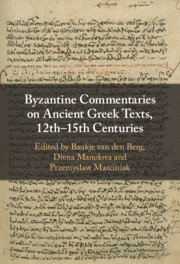Book contents
- Byzantine Commentaries on Ancient Greek Texts, 12th–15th Centuries
- Byzantine Commentaries on Ancient Greek Texts, 12th–15th Centuries
- Copyright page
- Contents
- Contributors
- Introduction Byzantine Commentaries on Ancient Greek Texts
- Chapter 1 The Politics and Practices of Commentary in Komnenian Byzantium
- Chapter 2 Forging Identities between Heaven and Earth
- Chapter 3 Cultural Appropriation and the Performance of Exegesis in John Tzetzes’ Scholia on Aristophanes
- Chapter 4 Uncovering the Literary Sources of John Tzetzes’ Theogony
- Chapter 5 Odysseus the Schedographer
- Chapter 6 Eustathios of Thessalonike on Comedy and Ridicule in Homeric Poetry
- Chapter 7 Geography at School
- Chapter 8 Painting and Polyphony
- Chapter 9 Parodying Antiquity for Pleasure and Learning
- Chapter 10 Teaching Poetry in the Early Palaiologan School
- Chapter 11 Late Byzantine Scholia on the Greek Classics
- Chapter 12 Theodora Raoulaina’s Autograph Codex Vat. gr. 1899 and Aelius Aristides
- Chapter 13 The Reception of Eustathios of Thessalonike’s Parekbolai in Arsenios Apostolis’ and Erasmus’ Paroemiographic Collections
- Index
- References
Chapter 8 - Painting and Polyphony
The Christos Paschon as Commentary
Published online by Cambridge University Press: 07 August 2023
- Byzantine Commentaries on Ancient Greek Texts, 12th–15th Centuries
- Byzantine Commentaries on Ancient Greek Texts, 12th–15th Centuries
- Copyright page
- Contents
- Contributors
- Introduction Byzantine Commentaries on Ancient Greek Texts
- Chapter 1 The Politics and Practices of Commentary in Komnenian Byzantium
- Chapter 2 Forging Identities between Heaven and Earth
- Chapter 3 Cultural Appropriation and the Performance of Exegesis in John Tzetzes’ Scholia on Aristophanes
- Chapter 4 Uncovering the Literary Sources of John Tzetzes’ Theogony
- Chapter 5 Odysseus the Schedographer
- Chapter 6 Eustathios of Thessalonike on Comedy and Ridicule in Homeric Poetry
- Chapter 7 Geography at School
- Chapter 8 Painting and Polyphony
- Chapter 9 Parodying Antiquity for Pleasure and Learning
- Chapter 10 Teaching Poetry in the Early Palaiologan School
- Chapter 11 Late Byzantine Scholia on the Greek Classics
- Chapter 12 Theodora Raoulaina’s Autograph Codex Vat. gr. 1899 and Aelius Aristides
- Chapter 13 The Reception of Eustathios of Thessalonike’s Parekbolai in Arsenios Apostolis’ and Erasmus’ Paroemiographic Collections
- Index
- References
Summary
This chapter looks at an unexpected text of the twelfth century and explores its engagement with ancient literature, specifically the Medea, Hippolytus and Bacchae of Euripides and the Rhesus, no longer thought to be by him. The text is the Christos paschon, a composite tragedy and Virgin’s lament, with prooimion, two prayers and a colophon, which tells the story of the Easter weekend in three plays of a trilogy by means of a Euripidean cento. The chapter proceeds source text by source text to indicate what passages are used and why. It then compares the reading of each source text in the Christos paschon with more modern receptions. The use of the source texts is then compared to painting as it is either dotted or sloshed on to the canvas. It can also be seen as polyphony as each source text enters in turn and interacts with the others. The trilogy’s reading of Euripides is examined and its possible performance context in the twelfth century. Finally, the text’s credentials as commentary are tested against criteria arrived at by recent students of classical commentary: it is certainly reception, possibly appropriation or emulation – and conceivably commentary.
- Type
- Chapter
- Information
- Publisher: Cambridge University PressPrint publication year: 2022

